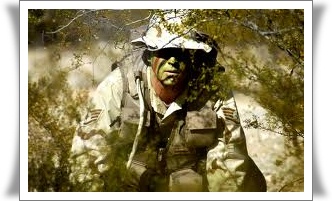Marine Survival Training: SERE, Survival Evasion Resistance Escape
The fundamentals of Marine survival training involve a strategy called SERE, an acronym for "survival, evasion, resistance and escape". This type of training focuses on the following key concepts:

- Survival hazards and aids regarding terrain, wildlife, plants and climate
- Psychological aspects of SERE
- Cross-cultural communication
- Identifying viable sources of water and food
- Preparing food in a survival situation
- Water purification techniques and food preservation
- Managing emotional and mental problems
- Self-treatment of illnesses and injuries in evasion, survival and prisoner of war situations
- Personal hygiene and proper sanitation methods to inhibit spread of disease
Marines involved in SERE training learn how to live in all kinds of sea and land wildernesses and climates as well as how to avoid enemy capture and internment. Resistant training is also included in SERE training programs, which teaches countermeasures for successfully opposing enemy interrogation.
Originally, Marine survival training began as a program for Air Force personnel after the Korean War ended for the United States in 1953. Pilots learned essential evasion and survival skills in case the enemy shot them down over hostile territory. Over the years, this doctrine has evolved to include classified escape and resistance strategies that currently comprise core SERE precepts.
SURVIVAL
SERE trainees are taught the following:
- S--Size up your physical condition, surroundings and available equipment upon finding yourself in a survival situation.
- U--Use all your senses to remain cognizant of your environment.
- R--Remember at all times where you are and what is involved with surviving your situation.
- V--Vanquish panic and fear, two emotions that are detrimental to successfully surviving any dangerous scenario.
- I--Improvise and improve.
- V--Value staying alive at all times.
- A--When in enemy territory, act like the natives.
- L--Above all, live by your wits
Marine Survival Training Emphasizes
In addition, all survival training programs for the Marines emphasize and demonstrate the following:
- Remain as compact and lightweight as possible
- Only carry reliable and necessary equipment
- Whenever possible, carry homemade survival kits that contain tube tents; matches; cigarette lighters; candles; signaling devices; brightly colored fabrics; utility knives; first aid kits; tin cups; water purification tablets; compass; folding saws and additional clothing.
Similar to survival techniques learned by civilians, this training further highlights the mental stress that combat soldiers face by including how to cope with food and sleep deprivation issues as well as techniques to help with enduring extended periods of isolation. Being captured by the enemy is not usually part of the typical survivalist's plan of action that primarily involves acquiring food, water and shelter following a catastrophe.
Facets of Marine survival training intended for special forces that deal with preparing psychologically for the possibility of capture are:
- Learning how to resist common "interrogation by the enemy" techniques such as torture and humiliation by undergoing sleep, water and food deprivation, prolonged nakedness and time disorientation.
- Distract or stall interrogators with strategies such as feigning illness or injury and pretending to collaborate with them by giving false answers to their questions instead of valuable information.
- If the enemy chases you into the wilderness, use as many camouflage techniques as possible. Avoid leaving tracks by re-crossing your own footprints and using creeks or rivers to break your trail. When trapped in thick woods, move during times of noise from wind, birds or thunder, so your pursuers do not hear you.
Studying Marine survival training manuals and learning how a combat soldier copes with the physical and psychological stresses of war can greatly benefit the civilian survivalist who is interested in learning as much as possible about withstanding a far-reaching and life-changing catastrophe. The manuals have served the military well, and the citizen who wishes to successfully manage the chaos of catastrophic events will improve their chances of success following these techniques.





New! Comments
Have your say about what you just read! Leave me a comment in the box below.